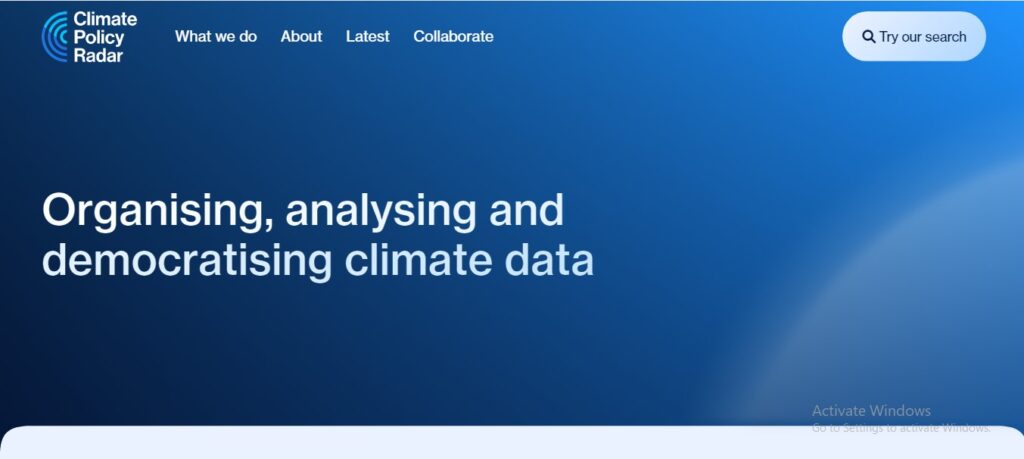Climate Policy Radar: Access and Analyze Global Climate Laws and Policies
Climate Policy Radar is a non-profit organization building a comprehensive and accessible database of climate laws and policies from around the world.
Description
Climate Policy Radar is a non-profit organization building a comprehensive and accessible database of climate laws and policies from around the world. Using AI and machine learning, they analyze and organize this information to help governments, researchers, and civil society understand and advance effective climate action.
Unique features:
- Open-access database: Provides a free, searchable database of over 5,000 national climate laws, policies, and international submissions.
- AI-powered analysis: Utilizes machine learning to analyze policy documents, identifying key topics, trends, and connections.
- Data visualization tools: Offers interactive visualizations to explore climate policy trends and compare actions across countries.
- Open data and code: Promotes transparency and collaboration by making its data, code, and AI models publicly available.
- Focus on climate justice: Aims to democratize access to climate policy information, empowering communities most affected by climate change.
How Climate Policy Radar works:
- Data collection: Gathers climate policy documents from various sources, including government websites, legal databases, and international organizations.
- AI-powered processing: Uses natural language processing (NLP) to extract key information and analyze policy documents.
- Data structuring: Organizes the information into a structured database, making it easily searchable and analyzable.
- Visualization and reporting: Provides tools to visualize data, generate reports, and track climate policy trends.
Key features and functionalities:
- Searchable database of climate laws and policies
- AI-powered analysis and topic extraction
- Interactive data visualization tools
- Country-specific policy comparisons
- Open data and code for collaboration
- API access for integration with other platforms
Use Cases and Examples:
Use Cases:
- Policy tracking and analysis: Monitoring climate policy developments and identifying best practices across countries.
- Research and advocacy: Supporting research on climate policy effectiveness and advocating for evidence-based solutions.
- Climate litigation: Providing data and analysis for legal cases related to climate change.
- Education and awareness: Educating the public and policymakers about climate policies and their impact.
- International cooperation: Facilitating collaboration and knowledge sharing on climate action among countries.
Examples:
- A researcher uses Climate Policy Radar to analyze the effectiveness of carbon pricing policies in different countries.
- A non-profit organization uses the platform to track climate policy commitments made by governments and hold them accountable.
User Experience:
While Climate Policy Radar focuses on providing climate policy information, its design and features suggest a user experience that prioritizes:
- Accessibility: The open-access database and user-friendly interface make it easy for anyone to access and utilize the information.
- Transparency: Open data and code promote trust and allow for scrutiny of the platform's methodology.
- Impact: By democratizing access to climate policy information, the platform empowers individuals and organizations to drive climate action.
Pricing and plans:
Climate Policy Radar is a non-profit organization and provides free access to its database and tools.
Competitors:
- Climate Change Laws of the World (Grantham Research Institute)
- Climate Action Tracker (Climate Analytics and NewClimate Institute)
- NDC Registry (UNFCCC)
Unique selling points:
- Comprehensive and AI-powered analysis of climate policies
- Open data and code for transparency and collaboration
- Focus on climate justice and empowering communities
Last Words: Stay informed and drive climate action with Climate Policy Radar. Visit their website today to explore the global climate policy landscape and contribute to a sustainable future.
